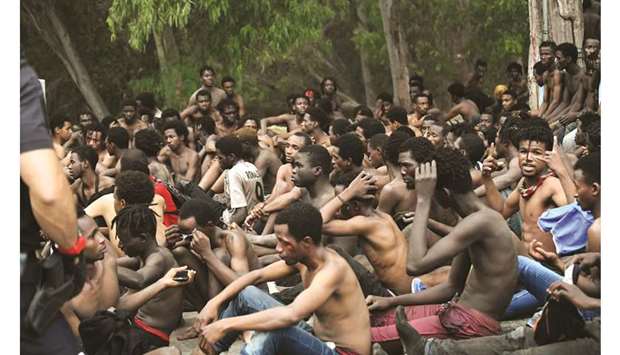More than 150 migrants crossed the border fence at Spain’s North African enclave of Ceuta and briefly clashed with police yesterday, the biggest attempt to enter across the heavily-guarded barrier in a year.
The incident took place on the same day that a separate group of 15 migrants rescued at sea arrived in the mainland port of San Roque aboard a Spanish warship from Italy, a high profile case that has drawn attention to Europe’s migration crisis.
The caretaker Socialist administration has drawn criticism at home for its handling of the rescued migrants after Italy’s refusal to take them in.
The far-right party Vox was quick to blame its soft stance for triggering the Ceuta incident, by creating what it labelled “a call effect”.
The government said the Ceuta incident was prompted by migrants there taking advantage of thick fog.
Cabinet spokeswoman Isabel Celaa told a briefing the number of illegal entries into Spain was down 47% this year.
In a special parliament session a day earlier, some parties criticised the government for accepting the migrants rejected by Italy, while others criticised it for not doing so more quickly.
At least six Spanish police officers and some of the illegal migrants suffered minor injuries in Ceuta, according to a government spokesman in the city, who added, however, that the incident was “not as violent as in the past”.
“Around 250 migrants tried to jump over the fence and some 155 made it,” the spokesman said.
Television footage showed a large group of shirtless young men chanting “Boza!”, or “victory” in the Fula language spoken in western Africa, as they were chased by police.
One of the men shouted “Respect!” in Spanish.
A group was later shown sitting on the ground surrounded by police.
Some had cuts from razor wire, others were washing their eyes with water after apparent contact with tear gas.
Recent years have seen hundreds of thousands of migrants per year attempting the journey to Europe from North Africa, with thousands dying at sea.
Tougher enforcement has brought the numbers down in the past few years, but attitudes to the migrants have become one of the main faultlines in European politics, fuelling the rise of far-right and populist parties who want tougher policies.
The Spanish enclaves of Ceuta and Melilla on Morocco’s northern coast are a magnet for illegal African migrants trying to reach Europe in search of a better life.
The enclaves are surrounded by a 6m-high fence topped with razor wire.
In the last big attempt, in August last year, 600 migrants attempted to jump the fence and 118 made it onto Spanish soil.
Most were later returned to Morocco.
The previous month, more than 400 crossed.
Yesterday’s arrival of 15 migrants to the mainland port of San Roque across the Strait of Gibraltar from Ceuta was, by contrast, marked by few emotions.
Visibly tired and glum migrants walked ashore where police put them on a bus.
Part of a larger group of more than 100 people rescued by Spanish-registered boat Open Arms, they had been stranded off Italy’s coast for three weeks while the Italian government refused to let them disembark.
The 14 men and a woman will undergo health checks and will be granted provisional permits until their asylum applications have been resolved, Spain’s government said in a statement.
Madrid dispatched the ship last week to pick up the migrants, all of them Africans, after five EU countries agreed to take them in following a prolonged stand-off between the Open Arms and Italian authorities.
Italy’s outgoing far-right interior minister, Matteo Salvini, has banned ships carrying illegal migrants from docking at Italian ports in an attempt to stem the flow of people trying to cross the Mediterranean to Europe from north Africa.
Rights group Amnesty International said this week the Open Arms saga – one of a number of similar cases – underlined Europe’s failure to come to grips with the migration crisis.
An Italian judge on Thursday ordered the release of the Open Arms after it was seized by authorities last week.
The Open Arms charity hailed the decision as “a precedent showing the need to comply with international conventions and maritime law to protect the lives and dignity of people”.

Migrants are arrested after they forced their way into the Spanish territory of Ceuta.
